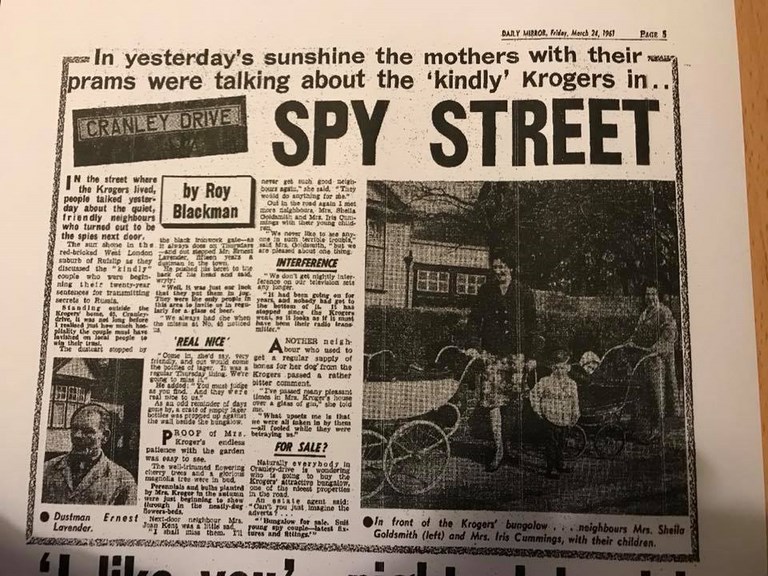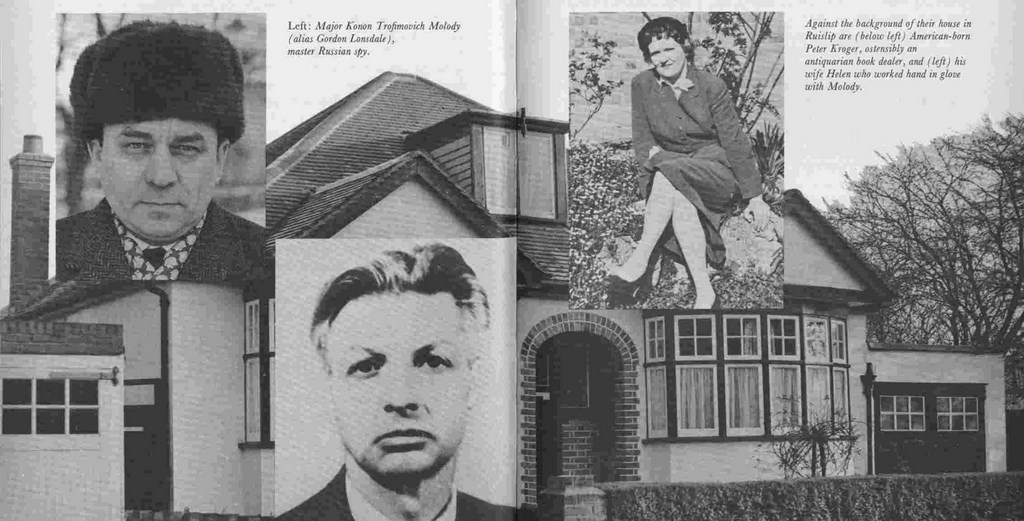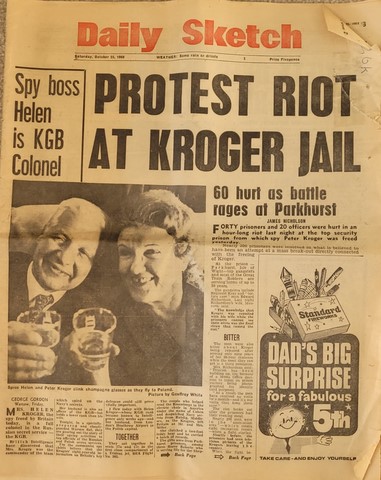More reading about the Krogers
In the papers....


It is assumed that you have read the main page on the Krogers before you arrived here!
This page give extra information and expands on some items already mentioned in the earlier page. This information is presented in no particular order.
The story was dramatised in to a TV play called "Act of Betrayal" and was screened in the late 60's. It starred Zena Walker and Stanley Meadows.
The playwright Hugh Whitmore then re-wrote it as a stage play which was called "Pack of Lies" and Judi Dench and Michael Williams starred in it. The play has toured the world and starred many famous actors most notably Patrick MaGoohan (The Prisoner) and Rosemary Harris when on Broadway.
It has also been dramatised for Radio 4.
One of the visitors to the Ruislip Online web once lived in the bungalow and talks finding hooks all around the roof to hold the aerial for the radio.
The kitchen in the house has a trap door under the floor which gives access to a small cellar.
The radio they used to send signals could not, initially, be found during searches of the bungalow. It was eventually found in the back of the fridge.
Londsdale was exchanged in 1964, after serving less than four years in prison, for Greville Wynne, an Englishman accused of spying in Russia. Londsdale was decorated and wrote his memoirs (with the help of Kim Philby) which were then made in to a film by the Russians. He died of a heart attack in 1970.
The bungalow had a "scrap book" that was handed from occupier to occupier at one time, it is not known if this is still in existence.
The Search family, whose house MI5 used to spy on the spies, were very good friends with the Krogers. Helen Kroger in particular would often pop around unannounced. Sometimes the MI5 agents would have to hide in the downstairs loo until she had gone!
In order not to attract attention the MI5 agents who came in the week were women, Mrs. Search was secretary of a local arts group, that was her cover if asked.
The TV play about the events was actually filmed around the corner in Eversley Crescent.
Mrs Search found the whole scenario a great strain. Some of the family blamed the stress caused by these events for her early death in 1969. This happened soon after the Krogers were exchanged for Gerald Brooke.
Remarkably one of their neighbours refused to speak to the Search family after details of the events unfolded thinking that their acquaintance with them could affect their fortunes if it got back to the husband's employers!
The Searchs' two children were in their teens the time and were told that the people in their house were "sort of police" and were not to say a word to anybody about it. They did not know what was going on had any connection with the Krogers until the morning the Krogers were arrested.
MI5 were spying on the Krogers house most weekdays during daylight hours, this surveillance lasted for about for around 2 months.
The Krogers were not allowed to visit each other in prison for years after their imprisonment.
The picture at the head of this page is take from:-
Great Cases of Scotland Yard, Volume One, (The Reader's Digest Association Limited, 1978). Taken from the chapter, The Portland Spy Case. This book seems to be out of print.
Some local people said that they would get bursts of interference on their TV sets and radios. Later, putting two and two together, they put this down to happening when when the Krogers were using their radio!
A visitor to Ruislip Online, having read the comments wrote as follows : -
At that time, I was a Milk Boy with United Dairies - working with George, who drove one of those three wheeled Electric milk-floats. On a Saturday, George collected the week's money from customers, and I would help. He'd say to me " number 16 - 3/6d and two pints gold " or similar and I'd take the milk and collect the money whilst George invariably went where he'd get a big tip.
He always sent me to the Krogers and I now know why. It took so long for them to open the door! The Radio was always on - very loud - and they took forever to unlock the door. George had virtually finished the next road by the time I had finished collecting the one house. Nothing to dramatic about this, but I never saw a face only the correct money in a persons hand.
A visitor to Ruislip Online wrote the following: -
My mother and father became friendly with Peter and Helen Kroger in the 1950s. My father was manager of Lewis's tobacconist shop next door to where Peter had his antiquarian book shop in the Strand. We visited the bungalow on a few occasions for lunch and they visited my parents home in Ilford. They were quite a charming couple (or appeared to be at the time).
Comments from a visitor to the site: -
The man known as Gordon Lonsdale in the Kroger affair was really KGB officer of high rank, in fact he was the highest rank ever captured. (I believe he was a Colonel). This high rank presented an embarrassment to the British spycatchers as one of the rules of play is to use such a captive eventually as someone to swap with one of yours that the other side has captured. The Russians did not have anyone of equivalent rank.
The identity of Gordon Lonsdale was assumed from a Canadian boy of that name who was born at Cobalt, a mining town in northern Ontario. His father married a Finnish lady to whom Gordon was born. There were no other children. Northern Ontario has always attracted Finnish immigrants. While Gordon was quite young, his father died and the mother decided to return to Finland to her home in the Lake Ladoga area close to what was then the border with Russia. This was shortly before 1940 when Russia invaded Finland. As part of the settlement that concluded this war, Russia acquired the area around Lake Ladoga.
In this way, young Gordon, who had a valid claim to a Canadian passport, became a resident of Russia and was never seen or heard of again, except when someone applied for a Canadian passport in his name. Gordon's father had a brother who married a sister of my wife's mother hence our family includes numerous Lonsdale cousins all of whom are cousins of the unfortunate Gordon.
Comments from a visitor to the site: -
In relation to your article about the 1960's spies there is quite a lot of material about this matter in Peter Wright's book "Spycatcher". MI5 had their suspicions about the Krogers, especially as they were supposed to be dead! They very carefully followed them to their home in Cranley drive, but so as not to arouse suspicion on themselves they did it painstakingly slowly, sometimes only following them for a few streets, but just enough to get another step closer to their home. Eventually they found the bungalow at Cranley Drive. The bungalow was watched by an MI5 "family" (in those days it was common practice for agents to socialise the aide of their wives and family) who were placed in the house opposite. When the time was ready to raid the bungalow, the local police were informed to provide the necessary manpower to police the operation. Unfortunately, this is where it all very nearly went wrong. An aspiring Detective Sergeant, decided to proceed with the raid without waiting for MI5 and by the time MI5 arrived on the scene they had to queue up behind all the press men who had received an "anonymous tip", possibly from someone hoping to be promoted to DI? The police apparently found very little that was incriminating, but Peter Wright and his colleagues knew what they were looking for (after all they had been monitoring their transmissions for months), and after a week of detailed searching (and much ridicule from the press) they found the specialist transmitter they had been monitoring.
As an item of interest, the Krogers pioneered the idea of microscopic photography. They would photograph a documents and then develop the negatives. They would then photograph the negatives and cut out the tiny square from the second negative which when blown up in a developing lab revealed the whole original document. These were sent out of the country in parcels containing books. MI5 routinely checked all of these books, and finding nothing simply repackaged them and sent them on their way, such a pity that they never peeled the stamp off, this where the tiny square of the negative was always hidden!
Comments from a visitor to the site: -
I used to live in Ladygate Lane with my parents and like most people had a TV. At the beginning of 1961 we were experiencing very bad reception when the picture would completely break up. This occurred at regular intervals during the day. Of course we complained to the television repair man about this (a shop next to Ruislip Manor tube). He came round on a number of occasions but was unable to fix it. Later out of the blue two men in civilian dress knocked at the door saying they were from the GPO and asked more about the problem. My parents explained that it happened during certain times of the day. Having been told this they left and said they would return and look at the TV set when it was expected for the picture to break up. They duly returned and saw what was happening to our programmes. They both conferred with each shaking and nodding their heads. They never touched the TV set! They eventually left and my mother thought they did not “look like TV repair men, they spoke much too nice” About two weeks later the Krogers were arrested. From then on we had a perfect picture!! I wonder?
Comments from a visitor to the site: -
It was early in the 1950s that I had made one of my regular business/sales visits to the Portland Stone Quarries and on completion I drove my car on to the somewhat primitive car park overlooking Portland Harbour and Naval Base. Through my business connections (electrical engineering) I knew of the existence of the Base, the Underwater Detection Establishment and the Whitehead Torpedo Works.
On the edge of the car park there were seats from which one could view from the Chesil Beach to the left, the dockyard and right across Weymouth Bay.
Whilst munching my roll and sipping the cup of tea bought from the mobile café nearby, I saw a VW Beetle arrive. A woman got out, sat on one of the seats and took out her luncheon box. Not an unusual sight’
Very soon she stood up and took a series of photos in a panoramic sequence of the whole view before her. My being a keen amateur photographer it was clear to me that I was watching no ordinary visitor photography and so picked up my ever-ready camera and photographed her. She turned and saw what I was about, hastily collected her belongings and fled in her VW.
I felt this was something not to ignore and having taken her car number I reported to Weymouth Police informing them of my concern and that I had photographed her. I heard nothing further.
Except that later..................My wife and I were running a guest house in Southampton at that time and I had a photographic dark room in the loft. There I kept my prints of colour slides and with them of course the ones I took of the Portland lady. It was later that I read of the Krogers fun and games in the media and realised I was looking at pictures of the woman I had photographed -- not of the ones I took. I sought to confirm my recognition by viewing my slides. But they were missing! Disappeared from my files.!
In the time between my Portland experience and my discovering my loss, I recalled that among the many paying guests we had accommodated we had fed and bedded a tall, charming and well educated chap who had told us he was attached to the Southampton Branch of the Bank of England. I remember at the time that it seemed odd that the bank had not put him up in a decent hotel.
I recall his name. But who was he really? Had he been in my darkroom on a search?
Comments from a visitor to the site: -
I with my parents lived /lives 2 houses away from Search's house and my brother and I often played in the garden and were given apples by Helen from trees in her garden.
I remember my brother coming back one day having been playing with Nick Search and commenting that it was strange that the Search's had 'friends' staying for tea, but that the 'friends' were eating in the kitchen, and the rest of the Search family were eating elsewhere (dining room).
I being a few years younger did not 'play' with Nick and Gay Search, but being a youngster keen of cars, picked up on the strange 'American' who parked his large American car (Buick / Oldsmobile) at the back of the bungalows in the next road (Denbigh Close), that only had foot access to Cranley Drive.
We used to ask about the car, to which the American told us to ‘guard’ the car.
I found it strange that he parked his car and walked through the alley, rather than driving down Cranley Drive.
I did not fully understand when Helen and Peter Kroger were taken away by the police, but I do remember sitting on the wall with Mrs Search a few years later when they were making the play filmed in Eversley Crescent, which deeply affected her, and I believe contributed to her passing shortly after.

